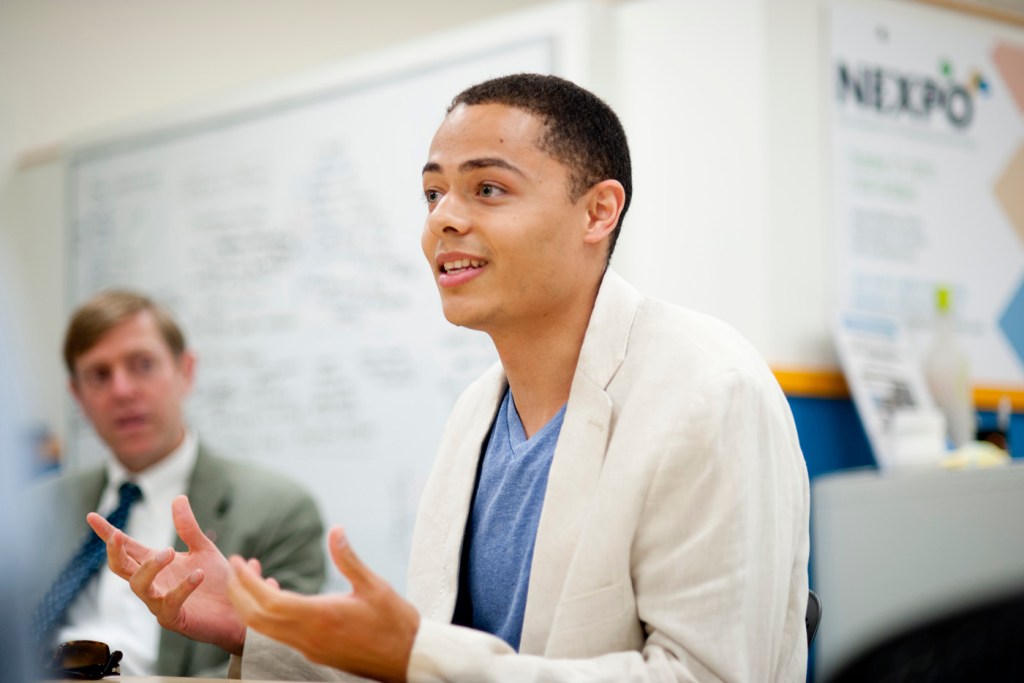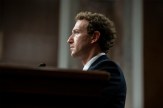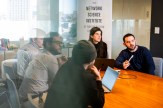The connector

The inspiration behind Amino—a mobile-based social service aimed at connecting users with specialized interests—dates back to the teenage years of Ben Anderson, the tech savvy co-founder whose niche hobby of building robots engendered little enthusiasm among his closest friends.
“I would show them the cool robots I had built and they didn’t seem to care at all,” recalled Anderson, now a 25-year-old entrepreneur on the rise. “I knew there were people from Mississippi to Japan who loved geeking out with robotics like I did, but I had no way of connecting with them.”
Hence Amino.
Anderson, AMD’12, and his business partner Yin Wang, PhD’11, co-founded the Boston-based startup in 2011 and began building the brand in 2013. Its iPhone apps—ranging from the Dr. Who amino to the K-pop amino—have been downloaded more than 500,000 times by users in more than 50 countries.
The Dr. Who amino is the world’s largest mobile social network for super fans of the popular sci-fi program, giving users a chance to discuss Daleks, Cybermen, and the TARDIS with their fellow Whovians.
“Our vision is to own the interest market and become the best way for users to experience their interests on their mobile devices,” Anderson explained. “I see a future in which we have an app for every popular book, movie franchise, you name it.”
In July, Amino announced that it had raised $1.65 million in seed funding, led by Union Square Ventures, the New York city-based venture capital firm know for its investments in Tumblr, Twitter, and Kickstarter. The majority of the capital will be used to expand the team, Anderson said, with a focus on recruiting marketing experts and developers for the iOS and Android operating systems.
Anderson connected with Union Square through his participation in Techstars, a highly selective mentorship-driven startup accelerator for budding companies in cities like Boston and London. The 13-week program—which included a $100,000 convertible debt note, as well as legal advice, mentorship, and office space—culminated in demo day in April at the House of Blues on Landsdowne Street in Boston, an event attended by some 800 movers and shakers in the startup sector.
“Investors from all over the world look to the Techstars program for new opportunities,” Anderson said. “People want to talk with us because they know we have a higher probability of success.”
Anderson’s ascent to the top of the startup mountain began at Northeastern in 2010, when he connected with IDEA, the university’s student-run venture accelerator. Since then, IDEA has awarded Anderson $20,000 in gap funding; hooked him up with an accountant, whom he still uses today; and paved the way for his meeting with Amino’s first angel investor.
Applying for gap funding from IDEA taught the fledgling entrepreneur a thing or two about what it takes to succeed in the startup ecosystem. “I had to create a business plan and think about every little detail of my company, even though it was only in the concept stage,” Anderson explained. “Having IDEA’s high level-guidance and support was crucial for a new entrepreneur like myself.”
Over the past few years, he’s also branched out of Northeastern’s entrepreneurial ecosystem, taking advantage of opportunities to enhance his business acumen and expand his startup network. As a case in point, Anderson probed the minds of—and forged strong contacts with—two chief executives of his former co-op employer WHERE, a Boston-based startup which was acquired by PayPal during his 2011 experiential learning opportunity.
WHERE’s former chief operating officer is now an angel investor in Amino, Anderson said, “but the list could go on and on in terms of business connections I have made during my co-ops.”
Small wonder this ambitious entrepreneur has big career goals, though one could argue that connecting like-minded people in cities as far flung as Boston and Hong Kong through a mobile app is quite an achievement in and of itself. “I want to create something from nothing that has a positive effect on the world,” Anderson said.





